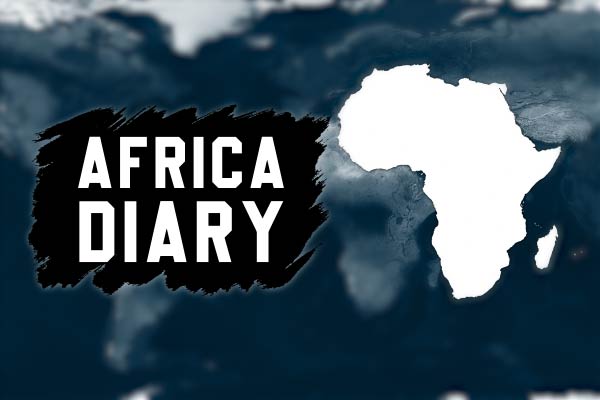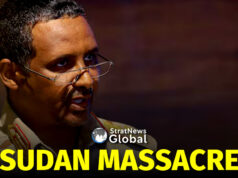Somalia Hosts Regional Summit To Coordinate Fight Against Al-Shabaab
Somalia’s President Hassan Sheikh Mohamud hosted a summit of leaders from several neighbouring countries late in January to discuss the regional fight against the Islamist insurgent group Al-Shabaab. Present were Kenya’s William Ruto, Djibouti’s Ismail Omar Guelleh and Ethiopian Prime Minister Abiy Ahmed. They discussed a coordinated military offensive against the Al-Qaeda-linked group, which has been waging an insurgency in Somalia for more than 15 years. Since taking office in May last year, President Mohamud has declared an “all-out war” on the jihadists, rallying Somalis to help flush out members of the Islamist group and in recent months, the army and local clan militia have retaken territory from the militants. However, the risk the Islamic terror group poses could be seen when at least four mortar shells landed near the presidential palace in Mogadishu ahead of the meeting, for which al-Shabab claimed responsibility.
Source: All Africa
Wagner Group Sustains Losses In Central Africa
Pictures of dead Russian soldiers on the border between the Central African Republic (CAR), Chad, and Sudan appeared on social media over the weekend. The soldiers reportedly belonged to the Wagner group, a mercenary group backed by the Russian government, which has been fighting alongside CAR government forces against a rebel force called the Coalition of Patriots for Change. Ahmadou Ali, a senior leader in the rebel group, confirmed it was responsible for an ambush where seven Russian soldiers of the Wagner Group were killed. CAR and Sudan are rich in gold and diamond reserves and a deal was struck last month between these governments to fight rebel groups seeking control over those reserves. The deal is expected to further cement Russia’s role in the security of the region.
Source: The Local Report
‘France Sabotaging Moves Towards West African Currency’
The Economic Community of West African States (ECOWAS), has accused France of frustrating efforts to adopt the ECO as a common currency in West Africa. It claimed that the French were sabotaging moves to replace the CGFA Franc with the ECO. Currently, the CFA franc is the common currency for the Franc Zone (a group of 14 countries in sub-Saharan Africa) created in the 1930s on the eve of the Second World War. Nigerian politicians say a “colonial mindset” was preventing some African countries from adopting it. They add that Francophone countries still see France as their master, and the French don’t want to let go of them which was the reason why they came up with the CFA franc in order to block the achievements of a single currency. The problem of Eco is not technical but it is political. If the leaders want it to happen tomorrow, they will announce it.
Source: WorldStage
‘Africa’s Growth To Outpace Global Forecast In 2023-2024’
Africa is set to outperform the rest of the world in economic growth over the next two years, with real GDP averaging around 4% in 2023 and 2024. This is higher than projected global averages of 2.7% and 3.2%, the African Development Bank Group said in the recently released Africa’s Macroeconomic Performance and Outlook report for the region. The report shows that an estimated average growth of real GDP in Africa slowed to 3.8% in 2022, from 4.8% in 2021 amid significant challenges following the Covid-19 shock and Russia’s invasion of Ukraine. Despite the economic slowdown, 53 of Africa’s 54 countries posted positive growth. However, risks including soaring food and energy prices, tightening global financial conditions, climate change—with its damaging impact on domestic food supply and the potential risk of policy reversal in countries holding elections in 2023—pose equally challenging threats.
Source: Africa News
Africa loses 15% GDP to climate change – AfDB
Africa has been losing between five to 15 percent of its GDP per capita growth because of climate change and its related impacts, said Kevin Urama, Vice President of the African Development Bank. He said Africa needed $1.6 trillion between 2022 and 2030 to meet its nationally determined contributions, (NDCs). Urama stated that so far African countries have received only $18.3 billion in climate finance between 2016 and 2019, leaving a gap of $1288.2 billion. Though Africa contributes to only three percent of global emissions, it is a heavy risk to climate change. Increased heatwaves and tropical cyclones have claimed lives but more importantly endangered Africa’s agriculture which is the backbone of the continent’s economy. The result is a lack of food security and a potential collapse of the economies of low-income countries in the region that are more reliant on agriculture.
Source: The News Digest
Ethiopian Govt Bans 15 foreign media outlets
Ethiopian authorities suspended 15 foreign media outlets operating in the country’s eastern Somali state. Those suspended include BBC Somali and Universal TV. They were accused of operating without a license. The suspension was ordered by the Ethiopian Media Authority in Addis Ababa, which requested the Somali state authorities to take action. The move follows recent reports of strained relations between independent journalists and the regional authorities. The Ethiopian regional journalists’ association said the suspension followed media reports highlighting government corruption.
Source: Africa News





